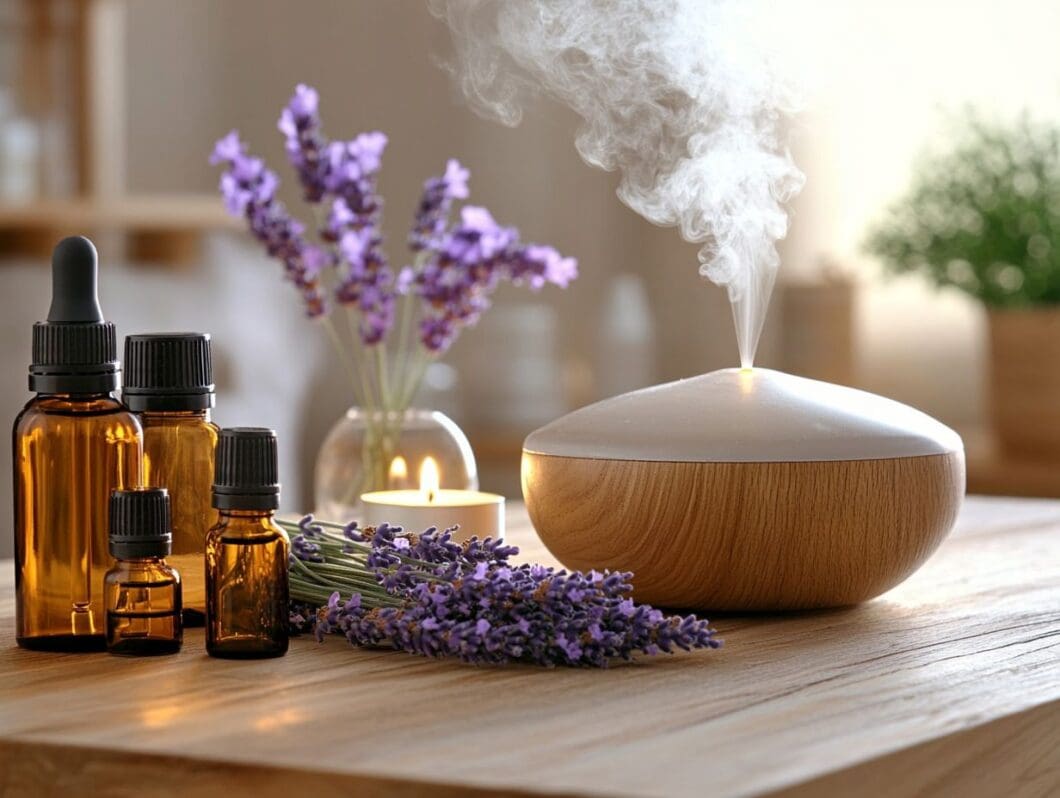Aromatherapy is more than just a fragrant indulgence; it’s a holistic approach that harnesses the power of essential oils for relaxation and well-being.
This article explores the benefits of essential oils, from stress relief and mood enhancement to physical health improvements.
Discover practical ways to incorporate these aromatic wonders into your life, including:
- Topical applications
- Inhalation techniques
Learn how to choose the right oils and navigate safety precautions to ensure a soothing and enjoyable experience.
Dive in to unlock the calming potential of aromatherapy and transform your relaxation routine.
Key Takeaways:
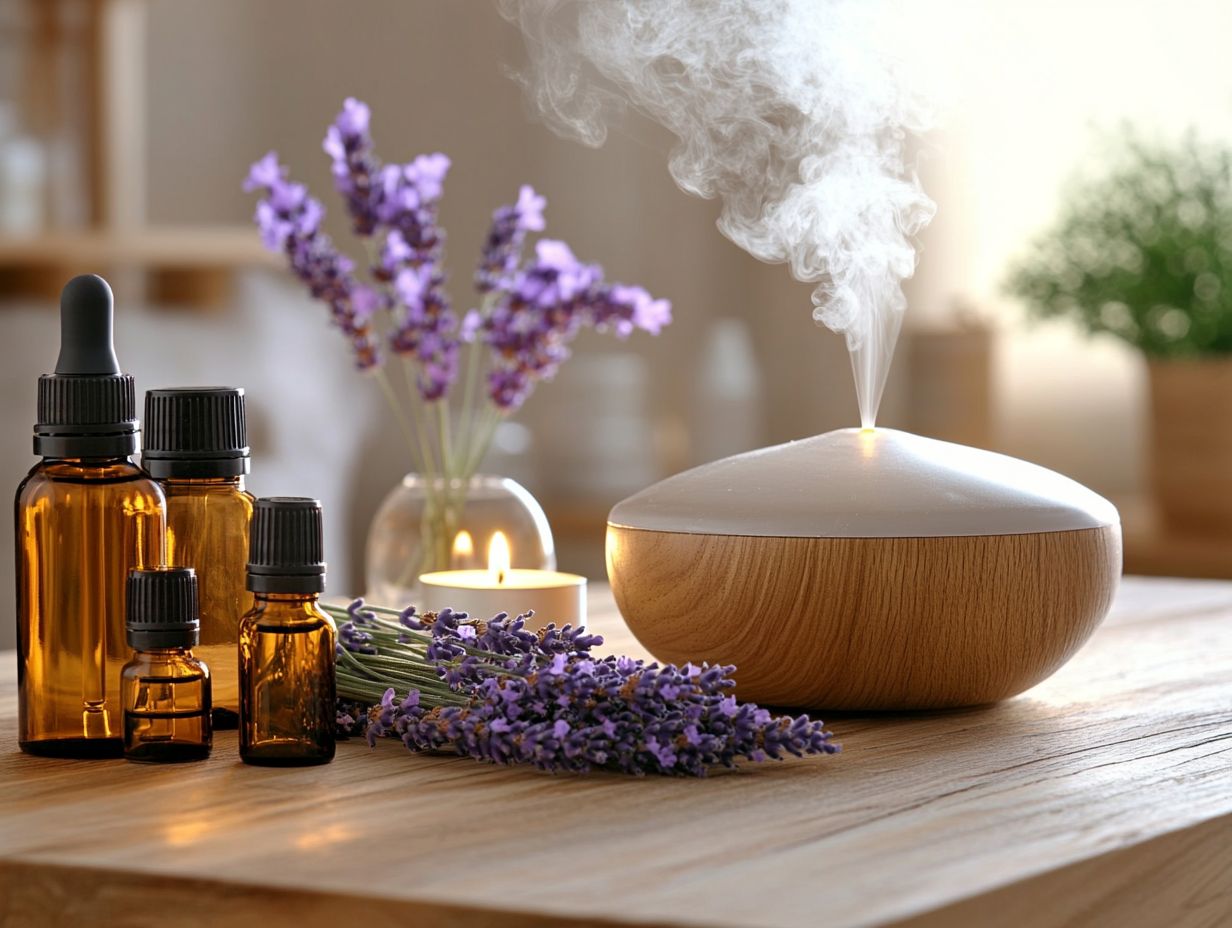
What is Aromatherapy?
Aromatherapy is a holistic treatment that employs essential oils extracted from plants to promote both physical and emotional well-being. By engaging the olfactory system, aromatherapy activates the limbic system, thereby influencing various bodily functions and emotional responses. This alternative form of medicine serves as a natural remedy for a wide range of issues, including stress reduction, anxiety relief, and enhancement of sleep quality.
Historically, the practice of aromatherapy dates back thousands of years, with its origins rooted in ancient Egypt and China, where essential oils were utilized for therapeutic, religious, and cosmetic purposes. In contemporary society, there has been a resurgence of interest in aromatherapy as an integral component of wellness routines, often combined with relaxation techniques such as meditation and yoga.
Many individuals utilize essential oils through diffusers or topical applications in an effort to create a calming atmosphere that fosters emotional healing. Furthermore, activating the hypothalamus through specific scents not only aids in mood regulation but also enhances overall emotional health, demonstrating the profound connection between aroma and well-being.
Benefits of Essential Oils for Relaxation
The benefits of essential oils for relaxation are significant, offering a natural remedy for anxiety relief, stress reduction, and overall mood enhancement through their various therapeutic properties.
Essential oils such as lavender, bergamot, and chamomile have been demonstrated to improve emotional health, enhance mental clarity, and promote a sense of calm.
Stress Relief and Improved Mood
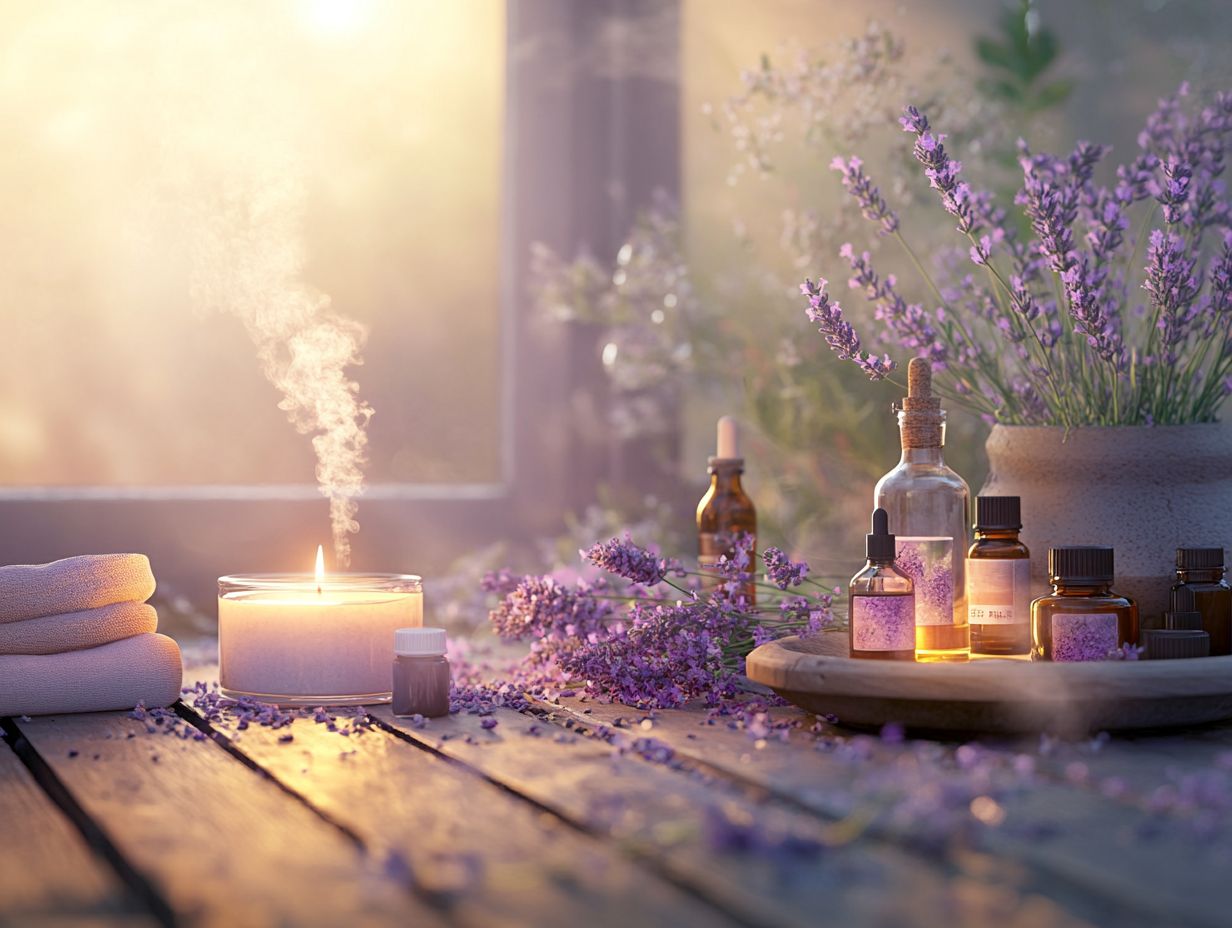
Essential oils are widely recognized for their capacity to provide stress relief and enhance mood, significantly alleviating symptoms of anxiety through their calming effects. Oils such as lavender and bergamot engage the brain’s limbic system, thereby enhancing emotional responses and promoting relaxation.
These aromatic compounds interact with the olfactory nerve, which has a direct connection to brain regions that regulate emotions. Inhaling essential oils aromatically can induce an immediate sense of calm, while topical application through massage therapy further enhances their effects by promoting improved circulation and deeper absorption into the skin. For more on the benefits of these oils, check out Aromatherapy Basics: Essential Oils for Relaxation.
Techniques such as diffusing oils in a space or combining them with carrier oils for gentle massage allow individuals to fully experience the therapeutic benefits, thereby creating a holistic approach to emotional wellness. By integrating these methods into daily routines, one can cultivate a serene environment that uplifts mood and mitigates stress.
Physical Benefits
The physical benefits of essential oils extend beyond mere relaxation; they offer effective pain relief and enhance overall wellness through various topical applications. By utilizing oils such as chamomile and cedarwood, individuals can experience significant improvements in both physical and emotional health.
To maximize these positive effects, oil blending is critical, as the combination of different oils can amplify their therapeutic properties and create more tailored solutions for specific concerns. For instance, a synergistic blend of peppermint and eucalyptus may effectively alleviate headaches while providing invigorating clarity.
Proper usage techniques are essential; diluting essential oils prior to application on the skin is necessary to prevent irritation. Adhering to safety protocols, such as conducting a patch test and avoiding contact with sensitive areas, ensures a protective approach to harnessing the numerous benefits that essential oils provide for pain management and overall physical health.
How to Use Essential Oils for Relaxation
The utilization of essential oils for relaxation can be accomplished through several methods, including inhalation and topical application, with each method providing distinct advantages for stress reduction.
Engaging the olfactory system through diffuser blends can enhance the therapeutic properties of oils such as lavender and bergamot.
Topical Application
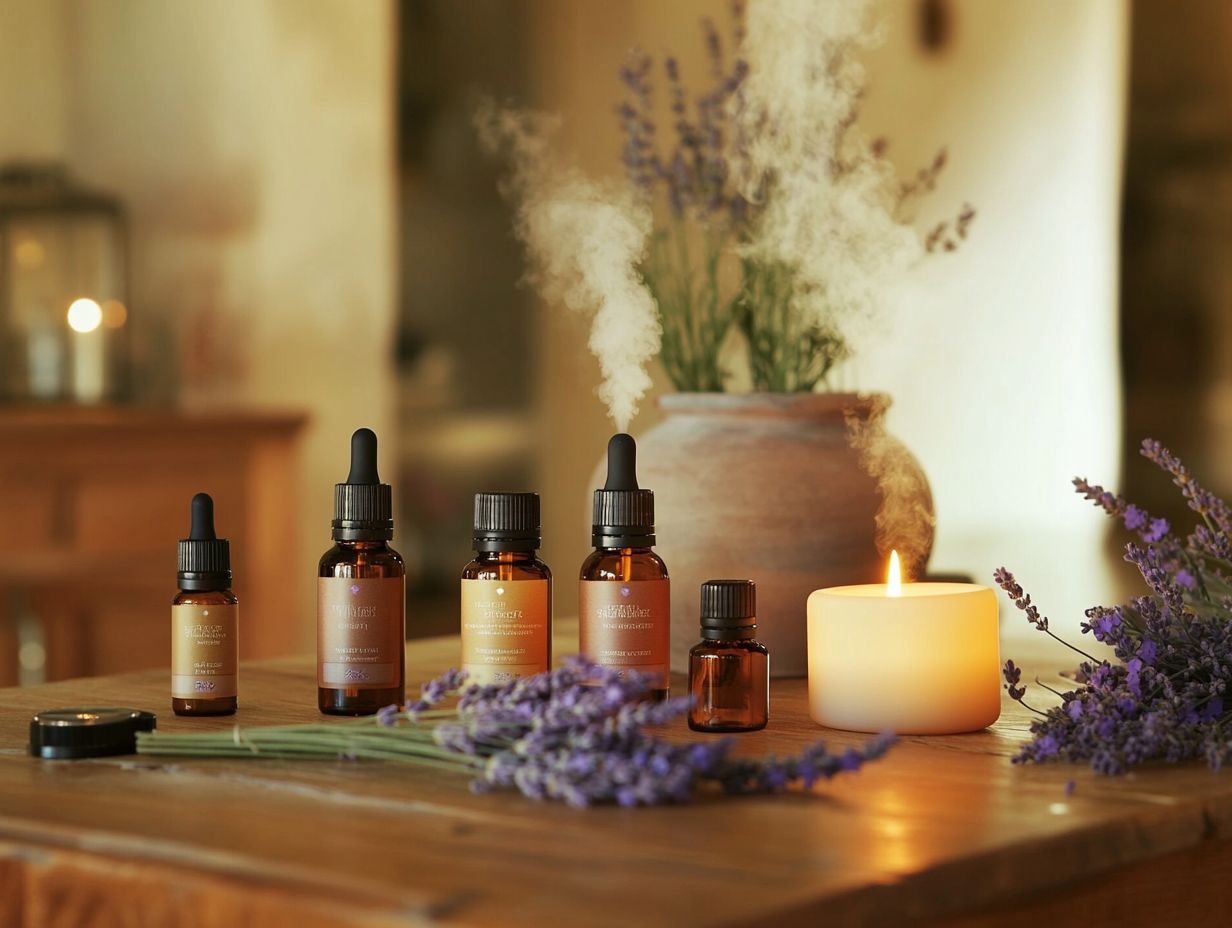
Topical application of essential oils involves the direct application of diluted oils to the skin, often combined with massage therapy to enhance relaxation benefits. Oils such as chamomile and lavender can be blended for various skin applications that promote both physical comfort and emotional relief.
To maximize the benefits while ensuring safety, it is essential to understand proper dilution ratios, which typically range from 1% to 5%, depending on the specific oil and individual needs. For example, a few drops of essential oil can be mixed with a carrier oil, such as coconut or jojoba oil, to create a soothing blend. Each application should be tailored to the client’s skin type to prevent sensitivities.
Conducting a thorough consultation is therefore crucial, as it allows for the identification of any allergies or skin conditions. This proactive approach not only enhances the effectiveness of the treatment but also fosters trust and comfort in the therapeutic process.
Inhalation
Inhalation serves as a primary method for utilizing essential oils, facilitating rapid absorption through the olfactory system, which significantly enhances relaxation techniques. Employing a diffuser allows for consistent and controlled exposure to calming scents such as bergamot and lavender, thereby promoting overall emotional health.
Steam inhalation represents another effective technique, where hot water infused with essential oils releases soothing vapors, aiding in the clearing of the sinuses while providing a deeply relaxing experience. Direct inhalation, often achieved by simply inhaling the aroma directly from an oil bottle, offers a swift elevation in mood.
Creating a calming environment is crucial; elements such as dim lighting, soft music, and comfortable seating can significantly enhance the experience. It is also important to recognize that scent receptors in the nose connect directly to the brain’s emotional centers, rendering each inhalation not merely a breath, but a pathway to emotional well-being.
Choosing the Right Essential Oils
Selecting the appropriate essential oils is essential for optimizing their relaxation benefits, as different oils possess distinct therapeutic properties that cater to individual needs and preferences.
Among the most favored oils for relaxation are lavender, bergamot, and chamomile, each chosen for its specific calming effects.
Popular Oils for Relaxation
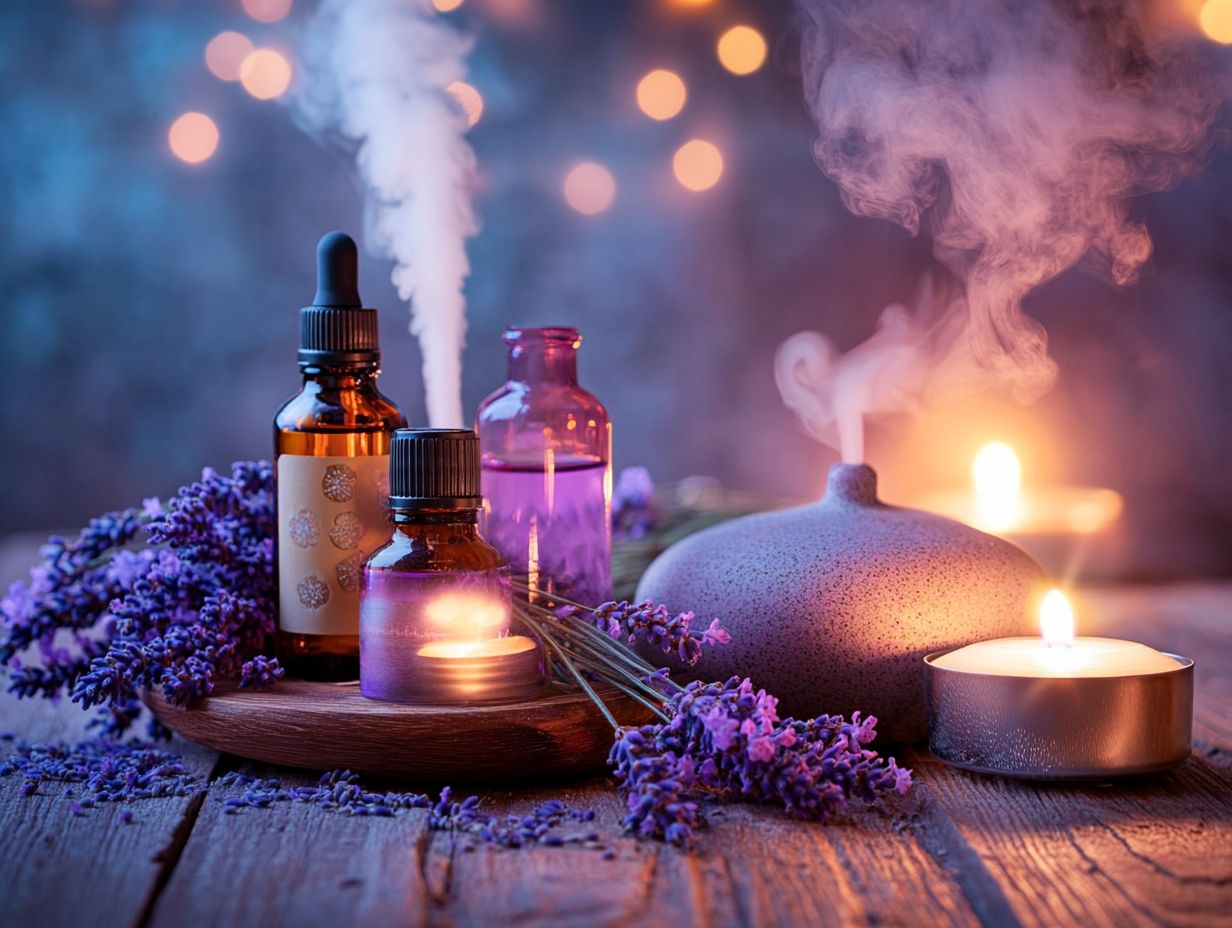
Popular oils for relaxation include lavender oil, recognized for its calming effects; bergamot oil, which is known to uplift mood; and chamomile oil, celebrated for its soothing properties. Each of these essential oils plays a significant role in stress reduction and emotional health, making them highly sought after in the field of aromatherapy.
Lavender oil, characterized by its delicate floral scent, is frequently utilized in diffusers to create a tranquil atmosphere, ideal for unwinding after a demanding day. Bergamot oil, extracted from citrus peels, functions as a mood enhancer and can be incorporated into massage blends or inhaled directly to invigorate the senses. Chamomile oil, valued for its gentle nature, is commonly infused in warm baths or employed in topical applications to promote relaxation and alleviate anxiety.
Collectively, these oils not only enhance the ambiance but also provide a holistic approach to emotional wellness.
Considerations for Sensitive Individuals
For sensitive individuals, it is crucial to approach the use of essential oils with caution by ensuring proper dilution and application methods to prevent adverse reactions. A comprehensive understanding of essential oil safety and potential allergens can significantly enhance the overall experience and effectiveness of aromatherapy.
It is imperative to evaluate skin sensitivity and allergy history prior to incorporating any oils into personal care routines. Conducting a thorough client consultation should be considered standard practice, allowing for a customized approach that takes into account unique sensitivities and preferences.
By discussing any prior experiences or concerns, individuals can effectively navigate the potential risks associated with specific oils. Patch testing is a recommended strategy that serves as an additional safeguard against unwanted reactions.
Adequate education on application methods—such as diffusion, topical use, or ingestion—ensures that essential oils can be utilized both effectively and safely.
Safety Precautions and Tips
Safety precautions are of utmost importance when utilizing essential oils, as improper usage may result in potential risks and side effects that could be detrimental instead of beneficial.
A thorough understanding of appropriate dilution practices and awareness of individual sensitivities is essential for ensuring a safer and more effective aromatherapy experience.
Proper Dilution and Usage
Proper dilution of essential oils is essential to ensure safety during topical application, particularly in massage therapy, where concentrated oils may lead to skin irritation. It is advisable to utilize carrier oils for diluting essential oils prior to application.
For example, a widely accepted dilution ratio is 2-3 drops of essential oil per teaspoon of carrier oil for adults, whereas children may require a lower concentration of 1 drop per teaspoon. Carrier oils, such as jojoba, coconut, or sweet almond oil, not only facilitate even distribution of essential oils on the skin but also provide additional moisture and nourishment, thereby promoting overall skin health.
When employing essential oils for inhalation, such as in a diffuser, it is crucial to adhere to the recommended guideline of approximately 5-10 drops in water, ensuring that this limit is not exceeded to avoid overwhelming the senses.
Understanding these best practices enhances both safety and efficacy, enabling individuals to fully appreciate the numerous benefits of aromatherapy.
Potential Risks and Side Effects
While essential oils provide numerous benefits, it is crucial to remain aware of potential risks and side effects, particularly for individuals with sensitivities who may experience adverse reactions. Common side effects may include skin irritation, allergic reactions, and interactions with medications.
The diverse nature of essential oils indicates that what may be highly effective for one individual could present risks for another. Recognizing the signs of a negative reaction, such as rashes or respiratory difficulties, is essential, as is tailoring usage based on individual responses.
Before incorporating any new oil into a routine, thorough research is essential, and consultation with a healthcare professional can offer further safety guidance. Staying informed enables individuals to make educated decisions regarding which oils are appropriate for their specific health conditions, thereby ensuring a positive overall experience.


